 Hot Tub Time Machine 2
Hot Tub Time Machine 2
Starring Adam Scott, Rob Corddry, Craig Robinson, Clark Duke, and Gillian Jacobs
Directed by Steve Pink
Rated R
Run Time: 93 minutes
Genre: Comedy
Opens February 20th
By Eric Forthun of Cinematic Shadows
Hot Tub Time Machine 2 opens with a nipple joke and closes with a dick joke. It's quiet poetic, considering the asinine attempts on display of repeating the previous film's successes to lesser, more vulgar degrees. While the original HTTM had a sense of nostalgia and a lighter comedic tone, the characters on display here are mostly repugnant and unlikable. By having Lou (Rob Corddry) take over as the main character of the film, the story is asked to navigate around a modern-day Caligula who has no likable traits or moral decency. So when we're asked to view the film through his eyes and watch his character supposedly change, it's off-putting and mostly uncomfortable. Yet the film's biggest fault comes from its belief that every one of its jokes is amusing, including homophobic jokes and outdated references to scarcely watched shows like Fringe. The film just doesn't have a clue as to how to spruce up its thin premise, falling into the trap of repeating its predecessor in almost every way. It's unoriginal, mostly unfunny, and a huge misfire.
The film picks up after the events of the first film, with Lou (Rob Corddry) inventing his knock-off brand of Google and being considered one of the biggest tech geniuses in the world. He's a billionaire, and his son, Jacob (Clark Duke), is the classic slacker of a rich father who doesn't aim for all that much. Nick (Craig Robinson) is still churning out hit after hit ever since he introduced the world to "Let's Get It Started," the Black Eyed Peas song he passed off as his own. And Adam (John Cusack) is nowhere to be found, although they believe he may have time traveled for some unknown reason. Nonetheless, at a self-indulgent party that Lou throws, he gets fatally shot in a nether region and faces his mortality; what if the guys went back in time, though, and prevented Lou's manhood from being destroyed? Lo and behold, they get black-out drunk (just like in the first film), Chevy Chase's crazy hot tub operator makes them uncomfortable, and they land 10 years in the future.
What could strike as genius ends up falling flat in almost every way. The jokes don't necessarily revolve around the future so much as more futuristic dick jokes. It's woefully uninspired. The concept of sentient Smart Cars is genius and almost feels like it belongs in a smarter, more adept comedy than this one, since the gags used for it are pretty impressive. How Hot Tub Time Machine 2 attempts to make sense of itself might be the most frustrating part of it all: it throws around supposed logic of alternate universes but doesn't seem to care about appealing to the audience. Instead, it treats the time travel as something that doesn't really matter or shouldn't be understood, even when they put a lot of effort into presenting the rules of the world. Adam Scott and Gillian Jacobs are the two new additions to the crew, and those apt comedic players are reduced to lifeless roles. It's a bland film, not particularly offensive or awful. Just lazy and vapid.

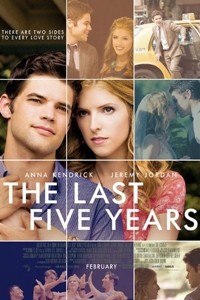 The Last Five Years
The Last Five Years
 Kingsman: The Secret Service
Kingsman: The Secret Service
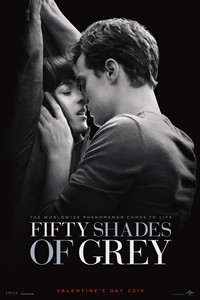 Fifty Shades of Grey
Fifty Shades of Grey
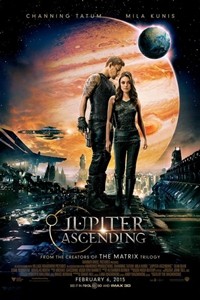 Jupiter Ascending
Jupiter Ascending
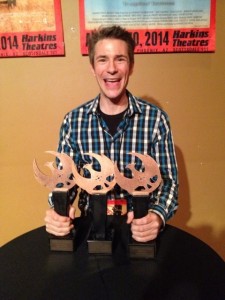 The film’s producer, Mark Stolaroff, represented at PFF 2014, accepting three awards: Best Picture; Best Director – Henry Barrial; and Best Screenplay – Joseph Vasquez (sadly, Vasquez died in 1995, never to see his last screenplay produced).
The film’s producer, Mark Stolaroff, represented at PFF 2014, accepting three awards: Best Picture; Best Director – Henry Barrial; and Best Screenplay – Joseph Vasquez (sadly, Vasquez died in 1995, never to see his last screenplay produced).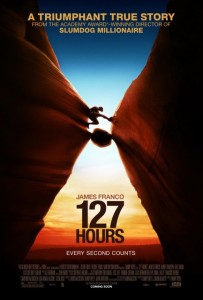
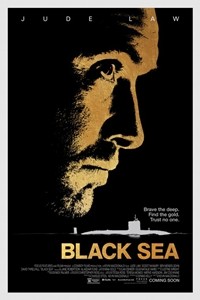 Black Sea
Black Sea
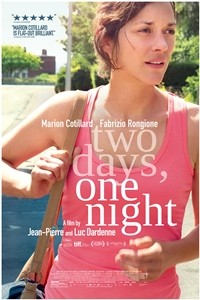 Two Days, One Night
Two Days, One Night
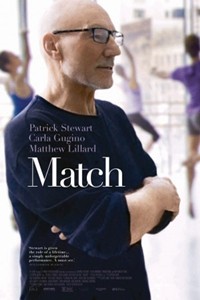 Match
Match
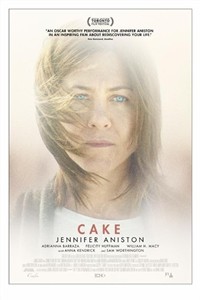 Cake
Cake
 Winter Sleep
Winter Sleep
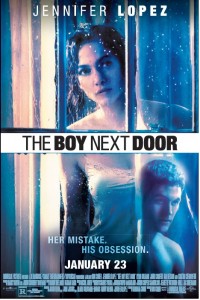 The Boy Next Door
The Boy Next Door
 King of Herrings
Dir: Eddie Jemison and Sean Richardson
King of Herrings
Dir: Eddie Jemison and Sean Richardson interesting quality of identifiable people. The leader with a Napoleon complex, the supportive to a fault friend, the peacemaker who keeps everyone calm, the friend who is waiting to take over, the lonely woman on the verge of self-discovery; these characters are all well rendered here. It’s a compliment to the narrative structure, which moves somewhat aimlessly, that these difficult characters remain believable amidst all the underhandedness that transpires. Though it’s easier to accomplish this when you have such a talented cast. Eddie Jemison is in the spotlight and accomplishes the task of becoming a loathsome character in the first few minutes of screen time. This continues throughout as Ditch vehemently muses on aspects of love, sex, marriage, and friendship. It’s comic yet wholly serious, a thin line that displays Jemison’s skill. Joe Chrest does a great job as The Professor, moving from an insufferable smart aleck, to a revenge-seeking degenerate, to a confused suitor; you never know what aspect of the character is genuine if any at all. The best character in the mix comes along unexpectedly in the form of Laura Lamson who plays Ditch’s wife Mary. Her character is mistreated and degraded by Ditch throughout, relinquished to an almost captive state as a lonely woman desperate for escape and the self-esteem to stand up to her husband. Lamson starts off subdued but slowly emerges as the strongest character amidst a group of men whose misguided masculinity in a way becomes their vulnerable limitation.
interesting quality of identifiable people. The leader with a Napoleon complex, the supportive to a fault friend, the peacemaker who keeps everyone calm, the friend who is waiting to take over, the lonely woman on the verge of self-discovery; these characters are all well rendered here. It’s a compliment to the narrative structure, which moves somewhat aimlessly, that these difficult characters remain believable amidst all the underhandedness that transpires. Though it’s easier to accomplish this when you have such a talented cast. Eddie Jemison is in the spotlight and accomplishes the task of becoming a loathsome character in the first few minutes of screen time. This continues throughout as Ditch vehemently muses on aspects of love, sex, marriage, and friendship. It’s comic yet wholly serious, a thin line that displays Jemison’s skill. Joe Chrest does a great job as The Professor, moving from an insufferable smart aleck, to a revenge-seeking degenerate, to a confused suitor; you never know what aspect of the character is genuine if any at all. The best character in the mix comes along unexpectedly in the form of Laura Lamson who plays Ditch’s wife Mary. Her character is mistreated and degraded by Ditch throughout, relinquished to an almost captive state as a lonely woman desperate for escape and the self-esteem to stand up to her husband. Lamson starts off subdued but slowly emerges as the strongest character amidst a group of men whose misguided masculinity in a way becomes their vulnerable limitation. actress Laura Lamson, the actor-director’s real-life wife. Lamson plays Mary, much-better half to Jemison’s Ditch, the wildly offensive leader to his circle of misfits and miscreants. When Ditch pushes his caustic sense of humor a little too far within the group, The Professor (played by Joe Chrest) plans a retaliatory strike by befriending Mary, Ditch’s lonely seamstress wife.
actress Laura Lamson, the actor-director’s real-life wife. Lamson plays Mary, much-better half to Jemison’s Ditch, the wildly offensive leader to his circle of misfits and miscreants. When Ditch pushes his caustic sense of humor a little too far within the group, The Professor (played by Joe Chrest) plans a retaliatory strike by befriending Mary, Ditch’s lonely seamstress wife. Winner of the Breakthrough Filmmakers Award at the 2014 Phoenix Film Festival, King of Herrings releases this
Winner of the Breakthrough Filmmakers Award at the 2014 Phoenix Film Festival, King of Herrings releases this  and Augie (John Mese). They're a ragtag group of friends that always seem to fight over trivial matters in New Orleans. The catalyst for the story involves a debt of nine dollars that's completely asinine in the grand scheme of things, but to these men means everything. It's a semblance of respect and honor that they cannot seem to fulfill that haunts their decisions and leads to increasingly disrespectful actions: adultery, threatening, violence, and anything else that could possibly destroy friendships. The characters aren't relatable in their actions but in their emotions; I cared for the characters when I could see compassion shining through their tomfoolery. Characters need heart and Jemison's film allows them that, even if there are slight bouts of misogyny that pervade the men's decision-making. King of Herrings meanders in the middle as the characters' actions begin to feel a bit strained, but the conclusion is worthwhile and a reminder that comedies must have notes of tragedy or else, well, what are we laughing at?
and Augie (John Mese). They're a ragtag group of friends that always seem to fight over trivial matters in New Orleans. The catalyst for the story involves a debt of nine dollars that's completely asinine in the grand scheme of things, but to these men means everything. It's a semblance of respect and honor that they cannot seem to fulfill that haunts their decisions and leads to increasingly disrespectful actions: adultery, threatening, violence, and anything else that could possibly destroy friendships. The characters aren't relatable in their actions but in their emotions; I cared for the characters when I could see compassion shining through their tomfoolery. Characters need heart and Jemison's film allows them that, even if there are slight bouts of misogyny that pervade the men's decision-making. King of Herrings meanders in the middle as the characters' actions begin to feel a bit strained, but the conclusion is worthwhile and a reminder that comedies must have notes of tragedy or else, well, what are we laughing at? A Most Violent Year
A Most Violent Year








